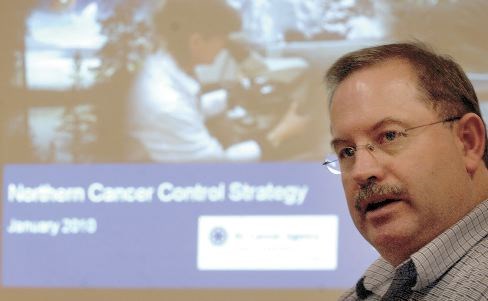Despite the excitement of opening the new cancer centre in 2012, Northern Health officials want northerners to understand that it is "just one small part" of the Northern Cancer Control Strategy.
Dr. Ronald Chapman, executive director, said the cancer control strategy is the whole journey of the disease from prevention promotion right through to life after treatment or palliative care for those who cannot be cured.
"This is not an easy journey, and the challenge for us is to improve the patient's journey as much as possible," said Chapman, noting the strategy plan is a partnership of Northern Health, BC Cancer Agency and the Public Health Services Authority.
The strategy begins with encouraging prevention or managing risk factors like smoking and obesity along with screening programs like mammograms and pap tests.
"Catching it early can mean a 100-per-cent cure."
When cancer is detected it means referrals to specialists followed by biopsies and diagnosis and treatment by surgery, radiation or chemotherapy.
With 10 cancer clinics now operating throughout the North, a lot of chemotherapy and surgery can be done closer to home, and that's all part of the strategy, Chapman said.
Although radiation treatment is still done in southern B.C., it will come to the North with the new cancer centre, and that's also part of the strategy.
Hal Collier, chief project officer of the northern cancer strategy, emphasized there's a distinct difference between the cancer centre and the cancer control strategy.
"The strategy is the business plan and the centre is the bricks and mortar.
"The plan has four basic goals: reduce incidents of cancer, reduce mortality from cancer, improve the life quality of cancer patients, and deliver treatment closer to home."
Enhancing the University Hospital for Northern B.C., formerly PGRH, with a six-bed unit for oncology patients and improved laboratory testing and imaging services is also part of the strategy as are such programs as Healthy Eating Active Living, radon gas testing in homes (since it accounts for 10 per cent of lung cancers), smoking cessation programs and more.
Chapman said 24 per cent of the northern population are smokers, which is much higher than the southern population where only 15 per cent smoke.
The strategy also includes two NH national pilot programs: The Transition Program is designed to help cancer patients return to normal life following treatment and Frankly Speaking is a psycho-social service to help patients get through the cancer journey.
The overall cost of the Northern Cancer Control Strategy for the North is about $100 million of which the new centre accounts for about $70 million.
In 2005, the BCCA and NH began to concentrate on some areas where they knew they could make a difference like encouraging tobacco reduction and providing chemotherapy treatment in northern communities, with general practitioners trained to deliver it.
The cancer control strategy really got underway in 2005-06 when consultation meetings across the North resulted in a report by Charles Jago and Jeff Burghardt, respectively the current and former Northern Health board chair, which showed northerners wanted both a cancer strategy and a cancer centre, Chapman said.



